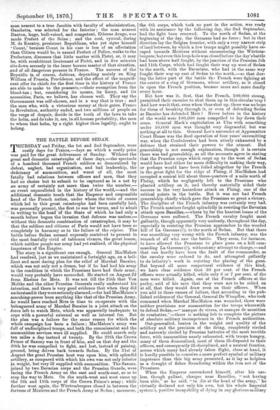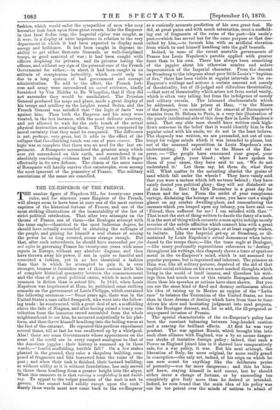THE BATTLE BEFORE SEDAN.
THURSDAY and Friday, the 1st and 2nd September, were
costly days for France,—days on which a costly price was paid for the great deliverance of Sunday. Without the .great and dramatic catastrophe of these days,—the spectacle of a hundred thousand French soldiers so demoralized by 'defeat, neglect, bad organization, and bad leadership, the deficiency of ammunition, and worst of all, the most fatally bad relations between officers and men, that they had no choice but to submit to be captured as in a net by an army of certainly not more than twice the number,— an event unparalleled in the history of the world,—and the additional dramatic touch that the Emperor and responsible head of the French nation, under whom the train of causes which led to this great catastrophe had been carefully laid, was personally present, the first to sue for terms, and to admit "" in writing to the head of the State of which he had only a -month before begun the invasion that defence was useless,— without this dramatic combination of catastrophes, it may be that the soldiers and citizens of Paris would not have been so completely in harmony as to the failure of the regime. The battle before Sedan seemed expressly contrived to present in the most fearfully vivid of tableaux vivants, the great lesson, which neither people nor army had yet realized, of the physical impotence of the Empire.
The story is a significant one enough. General MacMahon had resolved, just as we maintained a fortnight ago, on a bril- liant and most daring plan for the relief of Marshal Bazaine, which was not only not a dream, but if he had had his army in the condition in which the Prussians have had their army, would very probably have succeeded. He started on August 22 from Rheims for Metz. It was not till the 25th that Von Moltke and the other Prussian Generals really understood his intention, and there is very good evidence that when they did understandit they wereseriouslyalarmed,—for had MacMahon's marching-power been anything like that of the Prussian Army, .he would have reached Metz in time to co-operate with the beleaguered army of Marshal Bazaine in a joint attack on the -force left to watch Metz, which was apparently inadequate to cope with a powerful external as well as internal foe. But .the plan was a failure for the same reason for which the whole campaign has been a failure ; MacMahon's army was ,full of undisciplined troops, and both the commissariat and the ammunition services were ill supplied. He could march only ten miles a day instead of twenty. By the 29th the Crown Prince of Saxony was in front of him, and on that day and the .30th he was compelled to fight, and lost, instead of gaining, .ground, being driven back towards Sedan. By the 31st of August the great Prussian host was upon him, with splendid artillery, as compared with which his own was not only inferior in weight, but very ill supplied with ammunition. The Saxons, joined by two Bavarian corps and the Prussian Guards, were facing the French Army on the east and south-east, so as to stop the way to Metz. On the south-west and west came up 'the 5th and 11th corps of the Crown Prince's army ; while further west again, the Wurtembergers closed in between the .fortress of Maieres and the French Army at Sedan ; moreover,
the 6th corps, which took no part in the action, was ready with its assistance by the following day, the 2nd September, had. the fight been renewed. To the north of Sedan, at the beginning of the day, the Germans had no force ; but in that direction lay the Belgian frontier, with only a very narrow strip of land between, by which a few troops might possibly have es- caped towards Mezieres without encountering the Wurtem- bergers; but even this loop-hole was closed before the day's battle had been above half fought, by the junction of the Prussian 5th and 11th Corps, which had fought their way up west of Sedan to the north, with the Bavarians, who had in the same way fought their way up east of ,Sedan to the north,—so that dur- ing the latter part of the battle the French were fighting at the centre of a ring of Germans, whose artillery, as it closed in upon the French position, became more and more deadly every hour.
But how was it, first, that the French, 100,000 strong, permitted their enemies to shut them up in this circular trap ? And how was it that, even when thus shut up, there was no hope for them of breaking through it, or even of defending Sedan as Bazaine has defended Metz ? Never before in the history of the world were 100,000 men compelled to lay down their arms. General Mack's capitulation at Ulm with something under 30,000 men was thought very disgraceful, but was nothing at all to this. General Lee's surrender at Appomattox Court House was the final operation of four years' unremitting war, when the Confederates had been utterly exhausted by a defence that strained their powers to the utmost. Bad generalship is not enough explanation, though it is certain there was bad generalship, as all the accounts agree in stating that the Prussian corps which crept up to the west of Sedan would have had either far more difficulty in making their way, or perhaps would have been foiled altogether by the French in the great fight for the ridge of Floing, if MacMahon had occupied a conical hill about three-quarters of a mile north of Floing, which he negligently left to the Prussians who -planted artillery on it, and thereby materially aided their success in the very hazardous attack on Floing, one of the critical points in the battle. But it was not bad French generalship chiefly which gave the Prussians so great a victory. The discipline of the French infantry was certainly very bad. The French marines fought splendidly in resisting the Bavarian. attack upon Bazeilles,—where by far the heaviest losses of the Germans were suffered. The French cavalry fought most gallantly, though apparently very uselessly, throughout the day, especially in resisting the Prussian approaches to the wooded hill of La Garenne (?), to the north of Sedan. But that there was something very wrong with the French infantry, was the remark of all who saw the battle. They seem, for instance, to have allowed the Prussians to place guns on a hill com- manding La Garenne (?), without.any attempt to charge,—and that can hardly have been the fault of the commander, as the cavalry were ordered to do, and attempted gallantly to do infantry's work in resisting the placing of the guns. But beyond all mere conjectural evidence of this kind, we have clear evidence that 30 per cent. of the French officers were actually killed, while only 6 or 7 per cent, of the men were killed. Again, one of the French officers at the parley, said of his men that they were not to be relied on at all, that they would draw even on their officers. When you add to these causes of failure, that according to the pub- lished evidence of the General, General De Wimpffen, who took command when Marshal MacMahon was wounded, there were neither provisions nor ammunition for the troops wherewith to defend Sedan,—" manque de vivres, et manque de munition de combattre,"—there is nothing left to complete the picture of absolute military incompetence in the French authorities. Out-generalled, beaten in the weight and quality of the artillery and the precision of the firing, completely circled and narrowly circled by Prussian batteries of the most terrible force, with ammunition nearly exhausted, with troops hungry, many of them demoralized, most of them ill-disposed to their officers, and consequently ill-disciplined, and a neutral frontier, across which many had already taken flight, close at hand, it is hardly possible to conceive a more perfect symbol of military impotence than this big army presented, as it lay as helpless as a draught of fishes floundering within the iron net of the Prussians.
When the Emperor surrendered himself, after his use- less, though gallant, charges near Bazeilles, " not having been able," as he said, "to die at the head of the army," he virtually declared not only his own, but his whole Imperial system's, positive incapability of dying in any glorious military
fashion, which would enlist the sympathies of men who may hereafter look back upon these great events. Like the Emperor in that fatal Sedan trap, the Imperial regime was caught, as it were, in a display of utter impotence in relation to the very department in which it had been expected to display most energy and brilliance. It had been caught in flagrant in- ability to get either first-rate Generals, or well-disciplined troops, or good materiel of war ; it had been caught with officers despising its privates, and its privates hating the officers, and without any sign of the paternal care of the French Government for either,—in short, it had been caught in an attitude of conspicuous imbecility, which could only be due to a long system of bad government and corrupt administration. To add to the effect, the French fort- ress and army were surrendered on moral evidence, kindly furnished by Von Moltke to De Wimpffen, that if they did not surrender they would be annihilated. The Prussian General produced his maps and plans, made a great display of his troops and artillery on the heights round Sedan, and the French General was satisfied that " the logic of facts " was against him. Thus both the Emperor and his army were treated, in the last instance, with the most delicate courtesy, and not allowed to wait for the rude touch of the actual physical destruction awaiting them. They were conquered by moral certainty that they must be conquered. The difference is not, perhaps, very great, but it adds to the effect of the collapse that the clinching touch was one of pure reason. The logic was so complete that there was no need for the last ex- periment. A Bonaparte surrendered the greatest army which ever yet surrendered on this earth, and surrendered it on absolutely convincing evidence that it could not lift a finger effectually in its own defence. The charm of the mere name of Bonaparte will hardly survive that catastrophe, even among the most ignorant of the peasantry of France. The military associations of the name are cancelled.































 Previous page
Previous page